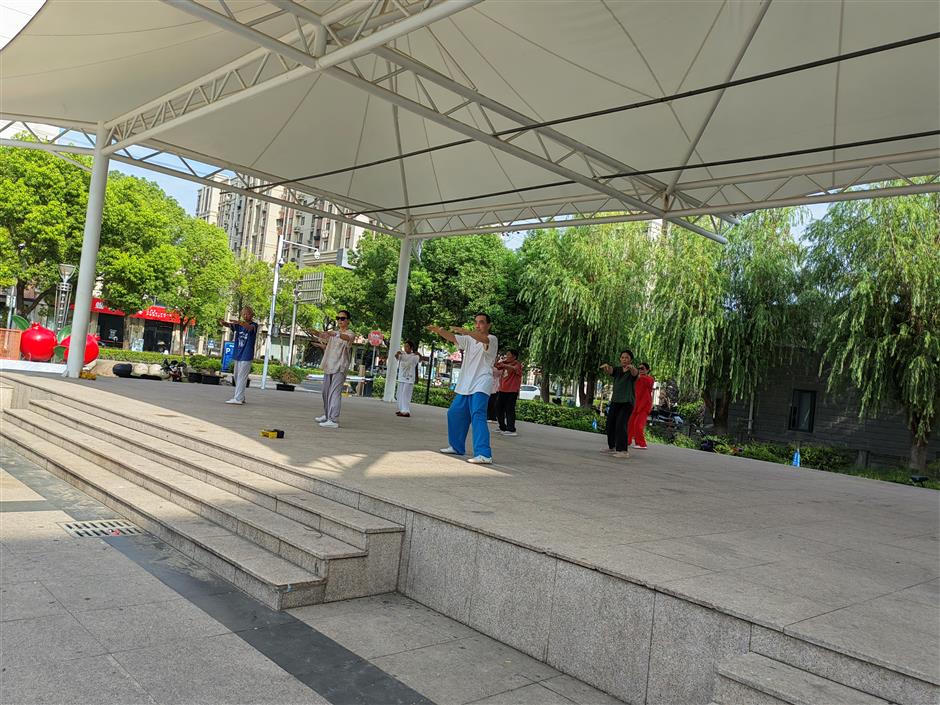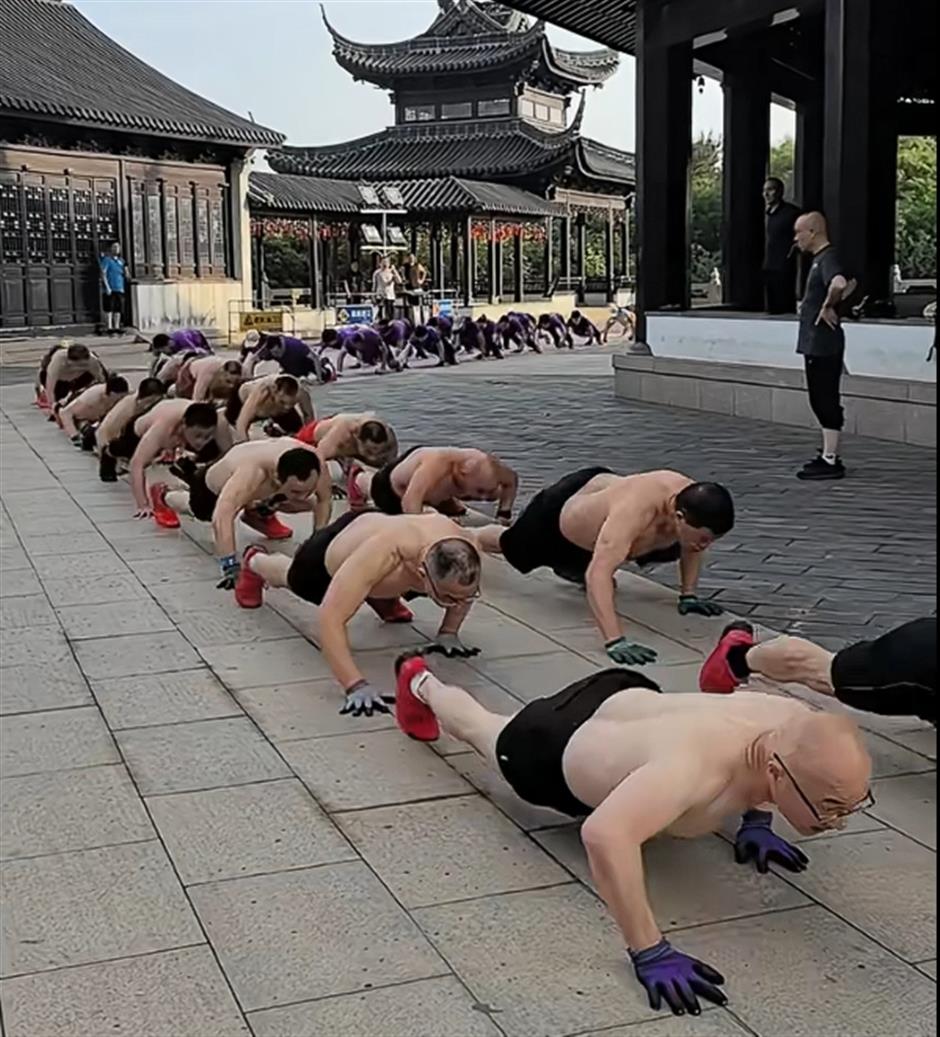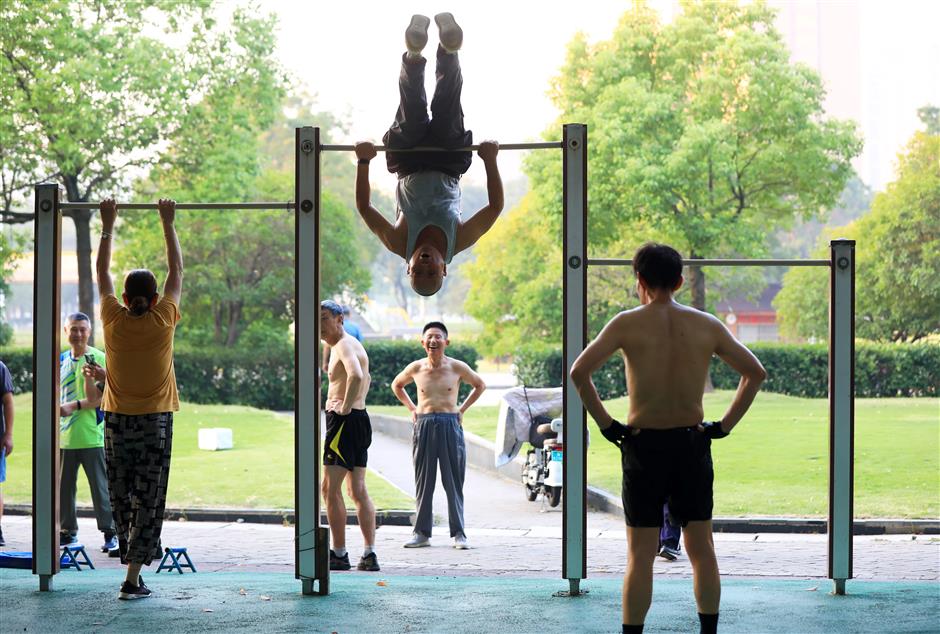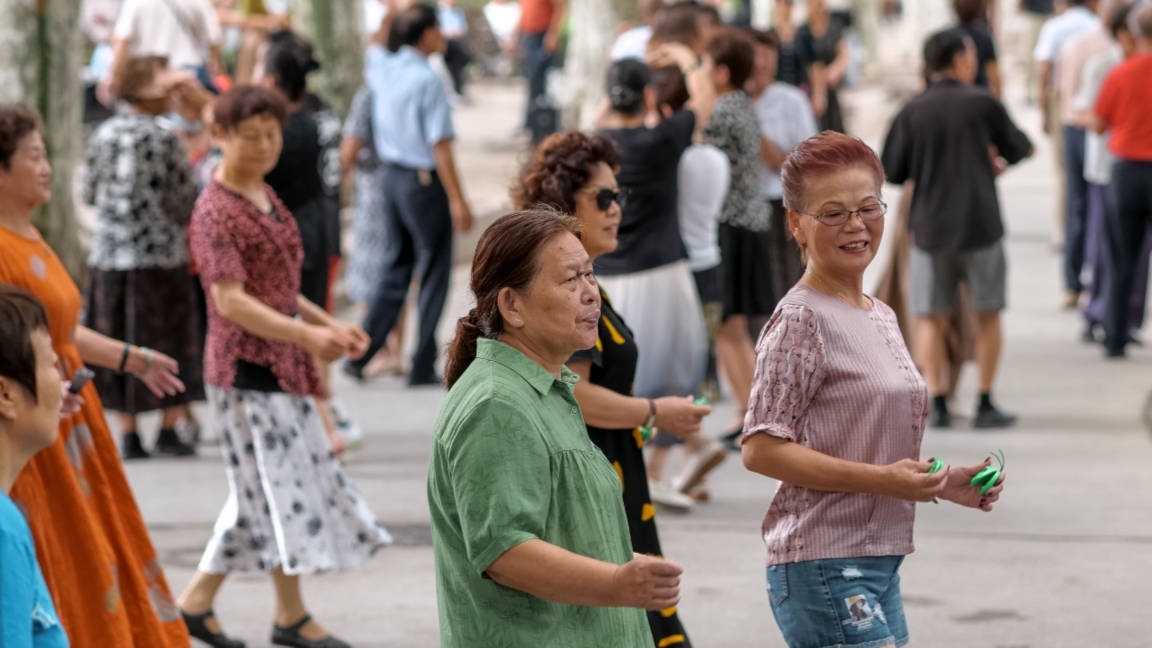
Recently, a viral video showed a group of elderly women singing and dancing, in sync, and to the accompaniment of loud music, on the aisle of a sleeper train compartment. The women were so proud of themselves that they had the whole scene filmed themselves.
The railway hotline 12306, upon receiving complaints, said that such behavior is strictly forbidden, and travelers could lodge a complaint, or seek out conductors on the train carriage.
This latest occurrence is yet a new addition to the litany of complaints against a type of elderly citizens who, while in reckless pursuit of their fitness, turn a blind eye to the basic civic norms and decorum otherwise assumed in a public space.
Other recent incidents included an elderly "power walking group" in a scenic area in northeast China's Liaoning Province whose marching phalanx on a road remained perfectly formed – and unyielding – in confronting an ambulance and a fire engine. Fortunately, these vehicles were on routine inspection, not on any emergency mission.
Such incidents arouse questions like: Why are old people in China so active in group activities?

Elderly residents practice tai chi on a raised platform at a local cultural center in Zhoupu, Pudong.
Yi Xiaoting, vice dean of Shanghai Open University's School of Humanities and Public Administration, characterized these age-specific collective events from a social perspective: They are easy to learn, they afford room for social interaction (given the fixed time and venue), and they are highly dependent on public space.
"Given the low threshold for attending these events, which also double as social gatherings, they might sometimes be perceived as encroachment on public space due to participants' lack of sense of boundary," she said.
Their behavior might obstruct public passages, sound noisy, or seem weird to the younger generation.
Significantly, they seemed to be restricted to those born in 1940s-1960s, but rarely to those born since 1970, for a reason.
"These people have all worked in a danwei (unit, or employer) in the prime of their life, where they become inured to a collective mode of life, leaving them a collective mindset almost as a sort of cultural legacy," Yi observed.
The phenomenon could also be explained in terms of changing values as our society evolves from an era of ration to an age of relative affluence.
"Although the seniors are living in a society of plenty today, deep in their consciousness still lurks the memory of the age of scarcity, hence their strong volition to participate in an event at no cost to themselves," Yi said.

Senior residents dance at Fuxing Park in Shanghai on Thursday.
Parks have long been among their most beloved spots, given that most parks in China offer free or low-cost access to the public. Back when there weren't nearly as many professional sports and cultural venues, parks and squares served as perfect spaces for all sorts of activities.
The demographic change provides another explanation.
With predominantly single-kid families today, several grandparents often compete to care for the single kids, and in Shanghai, the preference is usually given to the maternal grandparents.
The line dancers, some having grown up in the era of ubiquitous loudspeakers and political sloganeering, are sometimes unaware that the younger demographic today favor a social space that is quiet, tender, personal, and private.
To their dismay, their boisterousness acts draw frowns, which are not entirely justifiable, given the significant social benefits, in terms of the tremendous savings in medical care and, more importantly, in the upkeep of the seniors' psychological well-being, particularly for empty-nesters.
It is not an accident that Chinese are probably among the least susceptible to the sense of loneliness in their old age.
In addressing the potential conflicts between the dancers and surrounding residents, Yi said the rule of law is the bottom line. But she also suggested the exploration of tech solutions, by building anti-noise fences, or asking dancers to wear earphones. Their events could also be scheduled in such a way that minimize conflicts with or disturbance to others. Some of these measures have been successfully practiced in some communities in Shanghai.

Elderly choirs are also commonly seen in parks.
Li Wei, an associate professor at the College of Public Administration, Huazhong University of Science and Technology, has put forward a holistic solution for public service provision.
"With the graying of our society and rising life expectancy, we are seeing a new kind of retirees, better educated and better pensioned, who have far greater demands for cultural and sports activities. These activities are often synonymous with social interaction, and such needs, in turn, place higher requirements on the delivery of relevant public services," Li pointed out.
Yet seniors' strong demand for cultural and recreational activities largely falls into the category of public services classified as "non-basic" – and this is further compounded by the market's inability to meet such demand.
Li proposed several possible solutions.
"It is advisable for communities, schools and commercial entities to join hands in making over some spaces to elderly residents, so that they might go in for social and cultural activities free of charge, or at low prices. The benefits would be many: the elderly could have their needs met, with minimal disruption or disturbance to other residents, while new jobs would be created in the development of the 'silver economy'."
Here the government role must be clearly defined, as the leader and regulator of the whole endeavor, who would also ensure the legal status and operation of the requisite service providers.
In the absence of more enlightened guidance, the elderly, particularly those now with dexterity to work mobile panels, fall easy prey to peer influences, or unscrupulous commercial entities with an ax to grind. Chinese elderly have a strong volition to stay fit, and this is a laudable objective justifiable from myriad societal perspectives.
Li also believes that not all exercises are fit for the elderly.
While line dancing is generally a low-risk exercise, the same cannot be said of group power walking, or crocodile crawl.
Take crocodile crawl, which is originally intended as agility exercise for babies. Its suitability for the elderly is subject to individual physical conditions.
The practitioner crawls on all fours, with rigorously-choreographed and fast-paced limb movements, in imitation of a crocodile. It is quite an impressive view when a phalanx of uniformed practitioners are thus crawling in unison, particularly for those who have not seen any crocodile.

Doctors have warned that crocodile crawl could be risky for elders.
The exacting ritual could be risky for the elderly long accustomed to erect bearing, for an energetic prostrate posture on all fours in a coercively brisk pace might subject their fragile bones and joints to damagingly heavy load.
Having taught at the Chinese University of Hong Kong a few years ago, Li cited the practice of the Hong Kong Special Administrative Region, where elderly are encouraged to engage in exercises, with freely provided spaces for tai chi, ballroom dancing, table tennis, and badminton. Those aged above 60 can also use wellness facilities intended for ordinary citizens at preferential prices.
Significantly, the HKSAR also provides spaces for those aged above 60 so that they can engage in learning sessions or activities meant to foster understanding between the elderly, and the youth.
This is particularly important in the age of social media where amplification of some "outrageous" events involving the elderly tends to intensify hostility between different demographics.

Senior citizens are doing morning exercises in a park in Huai'an, Jiangsu.
Tan Thian Seng, a freelance writer from Singapore, also cited a number of local programs in his country for grandparents in HDB (Housing & Development Board) communities to "raise a healthy grandchild," to exercise anywhere, anytime, and a variety of free activities for seniors to stay healthy. Tan also mentioned Healthy 365, a mobile application by the Health Promotion Board that aims to encourage users to adopt a healthier lifestyle.

